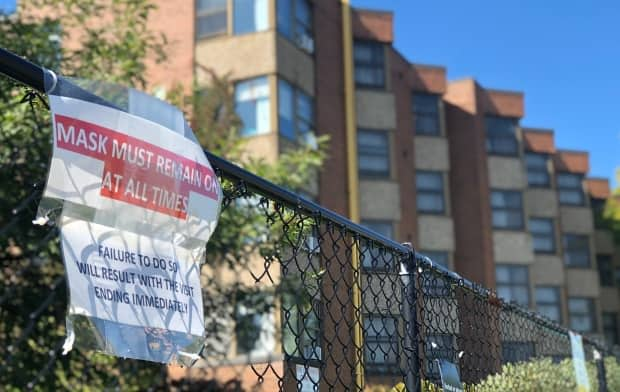Problems in Ontario long-term care homes need fixing now, PSWs and unions tell province
Personal support workers and their unions are calling on the province to fix problems in long-term care homes now before an expected resurgence of COVID-19 cases this fall.
Representatives of CUPE Ontario, SEIU Healthcare and Unifor said on Monday that the homes need adequate funding, increases in staffing to ensure there are "realistic" ratios of workers to residents, and sufficient supplies of personal protective equipment.
Candace Rennick, secretary-treasurer of CUPE Ontario, which represents nearly 35,000 workers, told reporters in an online news conference the provincial government must "step up."
The homes are not equipped to deal with an expected second wave of the novel coronavirus and residents and staff members are at risk of losing their lives, she said.
"The situation at the bedside is only going to get worse until we see concrete measures to address it. You cannot pretend that care levels will increase without a comprehensive staffing strategy and funding commitment," Rennick added.
Rennick said long-term care workers are afraid when they report to work.
"Some cry before starting their shifts. Some resort to praying. They're afraid of getting their residents sick. They're afraid of contracting the virus themselves. They're afraid of bringing it home to their families. They're afraid of blame," she said.
"We all know that this pandemic has made an untenable situation so much worse."
At the West End Villa in Ottawa, 11 residents have died since Aug. 30 amid a COVID-19 outbreak. Staff members there are still being denied access to N95 masks, she said.

Sharleen Stewart, president of SEIU Healthcare, called for an end to for-profit care. She said the province is not holding companies accountable for failures in the system. She said the long-term care homes are in worse shape today than they were before the pandemic.
Stewart said for-profit homes have 17 per cent fewer staff, pay their workers less and had worse outcomes in the pandemic than non-profit or municipally run homes. She said Chartwell, Sienna and Extendicare dominate the system in Ontario.
"We have no time to spare," Stewart said.
"Workers, elder care experts, seniors, and families alike are singing the same tune. They all want increased staffing levels for better senior care. They all want full-time jobs for our health-care workers. Yes, heroes," she said.
Stewart said PSWs should have a universal wage rate.
"Give them a raise and give them a pension. These essential policies are not items on a menu to be picked over and the rest discarded. They add up to a real action plan to fix Ontario's failed long-term care system."

One PSW, Jennifer Cloutier, a member of Unifor Local 2458, said working in long-term cares in the early months of the pandemic was terrible.
"To work through the pandemic was terrifying, was exhausting, was emotional. To go to work every day to see your residents dying is a horrible way to work," Cloutier said.
"We worked as little as three to four staff in a 24-hour period. How do you keep a resident alive with three to four staff, when I've worked a 20-hour shift and haven't even hydrated or nutritioned myself?" she asked.
"Mental breakdowns, depression, vomiting in cars and locker rooms happened daily in my home and I'm sure in many other homes."
Another PSW, Florence Mwangi, a member of CUPE Local 79, said a major issue was workload. She said workers were in tears every single day. Workers had the "pandemic on their back" while they were taking care of residents.
"It was a very confusing time for everybody in the home," she said.
Kelly Stephenson, of SEIU Healthcare, said: "We are tired of being called heroes and angels and not being treated as such. Staffing levels need to be increased."
Majority of homes 'managing very, very well,' minister says
When asked about the plan for long-term care homes in question period at Queen's Park on Monday, Merrilee Fullerton, Ontario's long-term care minister, said: "The plan is ongoing. We are continuing to be adaptable and vigilant. There is ongoing surveillance in our long-term care homes.

"We are increasing the layers of protection for our homes, whether it's a mandatory management order or a volunteer management agreement, or whether it's getting infection prevention and control or making sure that our staff in long-term care have N95s and access to those, and making sure that our communications — that the homes have proper communication with family members, and getting our caregivers back into the homes."
Fullerton said only three long-term care homes out of 626 in Ontario have more than three cases right now, which means the vast majority are "managing very, very well."
"The homes that are not, we are making sure every bit of effort, every time, is focused on those homes. It is an integrated effort, and we will continue to fight COVID."

